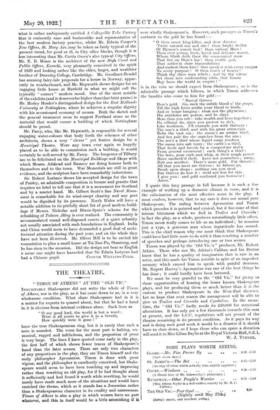THE THEATRE.
" TIMON OF ATHENS " AT THE " OLD VIC." LsnunrrAnix Shakespeare did not write the whole of Timon of Athens, nor is the play, as it has come down to us, in a very wholesome condition. What share Shakespeare had in it is a matter for experts to quarrel about, but that he had a hand in it is obvious from internal evidence alone. Such lines as
" 0 my good lord, the world is but a word : Were it all yours to give it in a breath, How quickly were it gone ! "
have the true Shakespearean ring, but it is rarely that such a note is sounded. The verse for the most part is halting, un- musical, ragged and infelicitous, and the proportion of prose is very large. The lines I have quoted come early in the play, the first half of which shows fewer traces of Shakespeare's hand than the later scenes. There are only two characters of any proportions in the play, they are Timon himself and the surly philosopher Apemantus. Timon is done with great vigour, and the philosopher is excellently conceived, but Shake- speare would seem to have been touching up and improving rather than rewriting an old play, for if he had thought about it sufficiently and had found it worth while rewriting, he would surely have made much more of the situations and would have enriched the theme, which as it stands has a Jonsonian rather than a Shakespearean character in its crudity and narrowness. Timon of Athens is also a play in which women have no part whatever, and this in itself would be a little astonishing if it were wholly Shakespeare's. However, such passages as Timon'a outburst to the gold he has found :- " 0 thou sweet king-killer, and dear divorce
'Twixt natural son and sire ! thou bright defiler Of Hymen's purest bed ! thou valiant Mars ! Thou over young, fresh, loved and delicate wooer, Whose blush doth thaw the consecrated snow That lies on Dian's lap ! thou visible god, That solder'st close impossibilities And makest them kiss ! that speak'st with every tongue To every purpose ! 0 thou touch of hearts !
Think thy slave man rebels ; and by thy virtue Set them into confounding odds, that beasts
May have the world in empire ! "
is in the vein we should expect from Shakespeare ; so is the admirable passage which follows, in which Timon addresses the bandits who come to him for gold :-
"Rascal thieves
Here's gold. Go, suck the subtle blood o' the grape, Till the high fever seethe your blood to froth, And so 'scape hanging : trust not the physician ; His antidotes are poison, and he slays More than you rob : take wealth and lives toget her ; Do villainy do, since you protest to do't, Like workmen. I'll example you with thievery : The sun's a thief, and with his great attraction Robs the vast sea : the moon's an arrant thief, And her pale fire she snatches from the sun : The sea's a thief whose liquid surge resolves The moon into salt tears : the earth's a thief, That feeds and breeds by a composture stol'n From general excrement : each thing's a thief : The laws, your curb and whip, in their rough power Have uncheck'd theft. Love not yourselves ; away, Rob one another. There's more gold. Cut throats : All that you meet are thieves : to Athens go, Break open shops : nothing can you steal But thieves do lose it : steal not less for this I give you : and gold confound you howso'er ! Amen."
I quote this long passage in full because it is such a fine example of working up a dramatic climax in verse, and it is the culmination of the most effective scene in the play. I must confess, however, that to my ears it does not sound pure Shakespeare. The railing between Apemantus and Timon which precedes it is pointed and cynical, but it has none of that intense bitterness which we find in Troilus and Cressida : in fact the play, as a whole, produces astonishingly little effect. Timon never really comes to life as an individual ; he remains just a type, a generous man whom ingratitude has soured. This is the chief reason why one must think that Shakespeare could have had little more to do with it than rewriting a number of speeches and perhaps introducing one or two scenes.
Timon was played by the "Old Vic.'s " producer, Mr. Robert Atkins. Those who saw Mr. Atkins's Caliban and his Brutus know that he has a quality of imagination that is rare in an actor, and this made his Timon notable in spite of an imperfect memory which caused him to speak with painful slowness. Mr. Rupert Harvey's Apemantus was one of the best things ho has done ; it could hardly have been bettered.
We must be very grateful to the " Old Vic." for giving us these opportunities of hearing the lesser known Shakespeare plays, and for producing them so much better than it is the custom to produce Shakespeare in the West-End theatres. Let us hope that next season the management will be able to give us Troilus and Cressida and Cymbeline. In the mean- time, the " Old Vic." badly needs its £30,000 for structural alterations. It has only got a few thousands towards this sum at present, and the L.C.C. regulations will not permit of the theatre remaining in its present condition. As it pays its way and is doing such good work it would be a disaster if it should have to close down, so I hope those who can spare a donation will send it to Miss Lilian Baylis at the Royal Victoria Hall, S.E.L W. J. TURNER.,


































 Previous page
Previous page